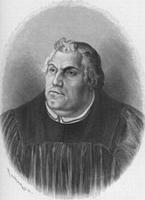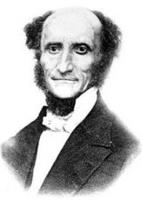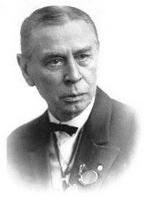Lutheran theology quite properly (and quite often) speaks of the "Means of Grace." These means are the ways in which God conveys and we thus appropriate His forgiveness. Article IV of the Augsburg Confession establishes the centrality of the Gospel and justification by grace through faith in Christ. Article V continues the thought by telling us how "we may obtain this faith": God instituted "the Ministry of Teaching the Gospel and administering the Sacraments" for this purpose. "Through [Gospel and Sacraments], as through means, he gives the Holy Spirit who works faith when and where he pleases...."
 In other words, the Means of Grace are those things through which we receive the benefit of Jesus' suffering and death on our behalf. They are the Gospel Word as proclaimed in the sermon and pronounced in the Absolution, Holy Baptism, and Holy Communion. These establish, grow, and strengthen faith as through them we receive the fulness of the forgiveness of sins, life, and salvation.
In other words, the Means of Grace are those things through which we receive the benefit of Jesus' suffering and death on our behalf. They are the Gospel Word as proclaimed in the sermon and pronounced in the Absolution, Holy Baptism, and Holy Communion. These establish, grow, and strengthen faith as through them we receive the fulness of the forgiveness of sins, life, and salvation.Such sweet and blessed comfort to have concrete and tangible instruments of delivery! God does not leave us to hope, to wish, to imagine, or to feel that we've been forgiven; through His called pastors, by the work of the Holy Spirit, He imparts forgiveness in our ears, upon our flesh, and in our mouths, physically confirming our great spiritual wealth.
 So why did I title this post "The Meanies of Grace" and who are all these stern looking gents peering from the page? I've discovered that proclaiming the Gospel ain't for sissies. The foes of these men certainly considered them "meanies" because they refused to compromise their beliefs or water down the pure, sweet Gospel which was entrusted to their stewardship.
So why did I title this post "The Meanies of Grace" and who are all these stern looking gents peering from the page? I've discovered that proclaiming the Gospel ain't for sissies. The foes of these men certainly considered them "meanies" because they refused to compromise their beliefs or water down the pure, sweet Gospel which was entrusted to their stewardship.While each may, at one time or another, have overstepped propriety and offended enemies (and even friends) with his vigor or vitriol, each also was vitally concerned that the Gospel be preached and taught in its truth and purity and the Sacraments be administered and received according to the word and the will of the Lord.
 Thus, each "thug" appears here because someone didn't like or agree with him and his stance on fidelity to the Faith. Most are familiar with the treatment dealt Martin Luther, with papal bulls, excommunication, and labeling as an outlaw by the Empire. All this because he cut Rome's purse strings, shined the Gospel light on Catholicism's shameful promotion of works-righteousness, and refused to recant his writings unless Scripture proved him wrong.
Thus, each "thug" appears here because someone didn't like or agree with him and his stance on fidelity to the Faith. Most are familiar with the treatment dealt Martin Luther, with papal bulls, excommunication, and labeling as an outlaw by the Empire. All this because he cut Rome's purse strings, shined the Gospel light on Catholicism's shameful promotion of works-righteousness, and refused to recant his writings unless Scripture proved him wrong.His successors, including Matthias Flacius and Martin Chemnitz, likewise had their detractors. While these two meanies were forced to continue contending with Rome, they also faced external challenges from Calvinism, radical reformers, and other non-Lutheran theologies. At the same time, Crypto-Calvinists (those claiming to be Lutheran but holding Calvinist beliefs) constantly warred with them from within the Evangelical camp.
 Internal and external struggles didn't end when Lutheranism crossed the Atlantic. By the mid-1800s, much of the American branch of the church had parted theological company with the faith confessed in the Book of Concord. While confessional fidelity existed in some areas, much of the United States knew only the "American Lutheranism" espoused by Samuel Simon Schmucker.
Internal and external struggles didn't end when Lutheranism crossed the Atlantic. By the mid-1800s, much of the American branch of the church had parted theological company with the faith confessed in the Book of Concord. While confessional fidelity existed in some areas, much of the United States knew only the "American Lutheranism" espoused by Samuel Simon Schmucker.Seeking as had the Crypto-Calvinists and others of bygone days to find common denominators between opposing confessions, American Lutheranism often ignored historic doctrinal (and Biblical) differences regarding the Sacraments, conversion, and other essential articles relating to the Gospel. Much of Carl Ferdinand Wilhelm Walther's life in the United States involved uniting Lutherans who subscribed unconditionally to the Confessions while working to root out false teaching, sectarian theology, and Methodist hymnody from the Lutheran Church.
Walther's labors included one of the greatest literary works of Lutheranism, The Proper Distinction between Law and Gospel, an exposition based upon evening lectures at Concordia Seminary, St. Louis. He also contributed at least as much and probably more than anyone else to the formation and early growth of The Lutheran Church — Missouri Synod. Needless to say, Walther's unyielding defense of the Gospel and unbending refusal to compromise on liturgical and unionistic issues alienated many.
 The final rogue pictured in this gallery is Francis Pieper. A gifted theologian, his Christian Dogmatics are still read and studied among Confessional Lutherans. As with the others, we can also make a case for him as a Meany of Grace. For one thing, he absolutely rejected any form of open communion, going so far as to emphasize the point in English in the German text of the Christliche Dogmatik. Pieper was also author of A Brief Statement of the Doctrinal Position of the Missouri Synod, which both clearly expressed Missouri's corporate confession while also informing those who disagreed that they were in the wrong, using such mean and thuggish terminology as "we condemn" and "we repudiate" in rejecting the theological errors of the time.
The final rogue pictured in this gallery is Francis Pieper. A gifted theologian, his Christian Dogmatics are still read and studied among Confessional Lutherans. As with the others, we can also make a case for him as a Meany of Grace. For one thing, he absolutely rejected any form of open communion, going so far as to emphasize the point in English in the German text of the Christliche Dogmatik. Pieper was also author of A Brief Statement of the Doctrinal Position of the Missouri Synod, which both clearly expressed Missouri's corporate confession while also informing those who disagreed that they were in the wrong, using such mean and thuggish terminology as "we condemn" and "we repudiate" in rejecting the theological errors of the time. Of course, these errors never went away. All the old ones — and some that are new — continue to plague Christ's Church. We can never have too many hard-headed theo-thugs who are willing to suffer all for the truth. Yet to be true Meanies of Grace, they must also believe, teach, and confess, the full, pure Gospel.
Of course, these errors never went away. All the old ones — and some that are new — continue to plague Christ's Church. We can never have too many hard-headed theo-thugs who are willing to suffer all for the truth. Yet to be true Meanies of Grace, they must also believe, teach, and confess, the full, pure Gospel.A real Meany of Grace will never sell out, yet will give all he can of himself to love his neighbor and his enemy as himself. A true Meany of Grace won't let you take the Gospel from him, yet will gladly and completely give it to you in all its sin-absolving purity. A Meany of Grace may grate on you as he refuses to be anything other than 100% Lutheran, yet he'll deeply care if you involve yourself in any teaching which denies or obscures any part of Christ's gracious work on our behalf. Thus, I leave a blank open here.
Can you picture yourself, your pastor, or your professors or teachers sitting amongst these thugs, aggravatingly unable to change in faith and practice yet giving, gracious, and loving toward lost and hurting people? If not, why not? If so, click on the comments and let us know.
One of these days, when I grow up, I will consider myself one... like my mother and grandfather before me.
I've always had a particular interest in: Robert Barnes, burned at the stake by Henry VIII and mourned by Luther as "that blessed martyr, St. Robertus."
<< Home



